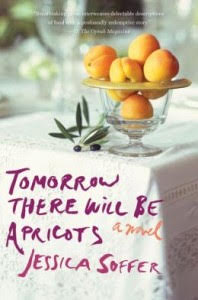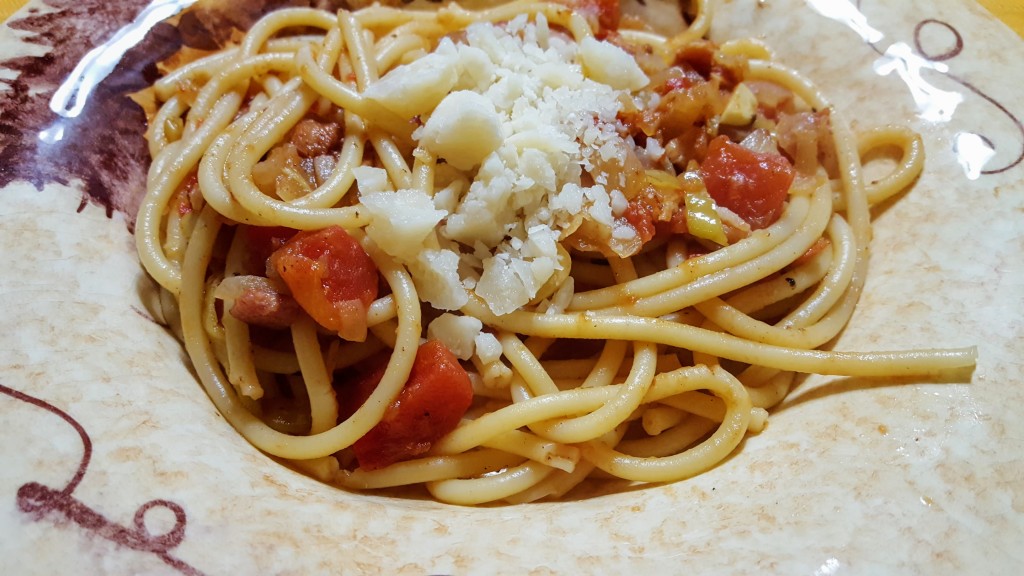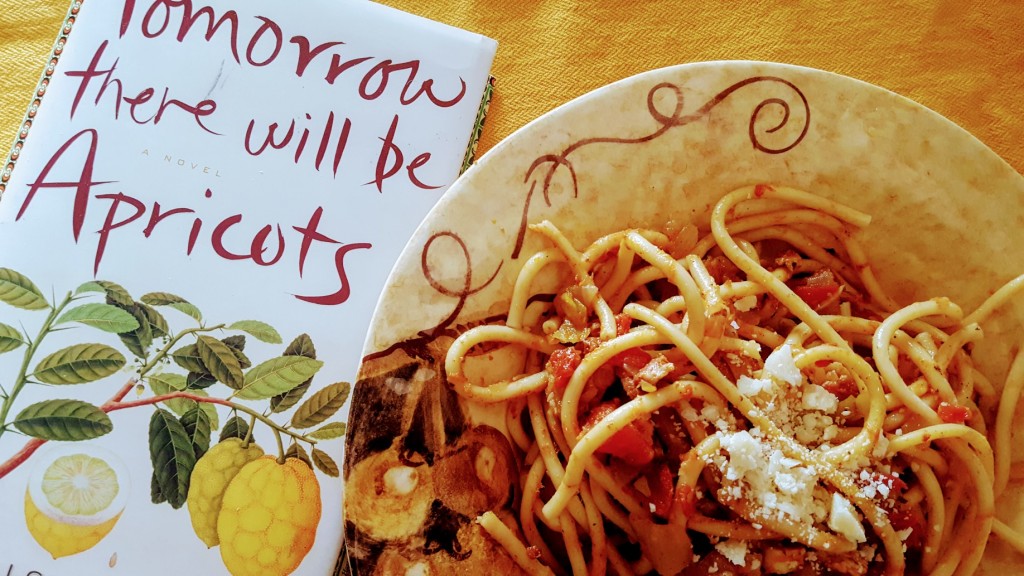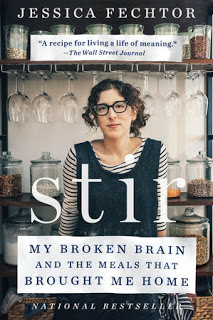Lorca thinks in food.
One haricot vert.
Two haricots verts.
Three haricots verts. (62)
Using green beans instead of a major river is how Lorca counts the seconds to keep herself calm.
While talking to Blot, a book store clerk who befriends her, she gets a lump in her throat the “size of Bundt pan” (97).
When describing herself she bemoans that her hair has “the texture of a frisee salad” (99).
Food is actually what helps Lorca keep it together.
As one of the main characters and narrators of Tomorrow There Will Be Apricots by Jessica Soffer, this fourteen-year-old girl has wisdom (and dysfunctionality) beyond her years. Lorca uses food to try to gain her mother’s attention and she is obsessed with recreating one of her mother’s favorite dishes, masgouf.
Enter Victoria, an elderly women coping with the loss of her husband and another darker event from her young adulthood. Victoria narrates alternating chapters in the novel. Victoria befriends Lorca (or vice versa) and both benefit from their lessons around food and perhaps Victoria has the secret to that masgouf.
Tomorrow There Will Be Apricots is the October/November selection for Cook the Books. Simona of briciole is hosting this round.
With Lorca’s mind revolving around food and with Victoria’s cooking lessons, there was much inspiration. All of the food descriptions were beautiful (as is much of Soffer’s language) and I really wanted to make a number of items.
Here is a list of foods and descriptions that resonated with me:
- Wild Mushroom Tart with Thyme: “I’d made a wild mushroom quiche, just to see if it could prove to my mother that I was worth keeping around” (18).
- Shakrlama: “Delicious little almond and pistachio cookies” that Victoria teaches to Lorca (143).
- Almond malfuf: An early treat that Victoria sold at a bakery before the opening of the restaurant (256).
- Kubba with squash: When Victoria hopes for a family in Lorca, she makes this dish because it was “a grandmotherly thing to make” (271).
Then, of course, there is the mysterious and illusive masgouf. Although masgouf is the central quest of the novel, this dish represents much more to Victoria and Lorca. Victoria rues the day the masgouf turns out for that will be the end of the lessons. Lorca, although she is determined to learn the dish, will hate it when the quest is over and Blot is not her research companion.
Masgouf brings all of the lonely characters in the novel together. Masgouf equals friendship, fellowship, and sharing humanity. It represents warmth and family, even to Lorca’s cold mother (226).
As you can see, I researched and found recipes for most of the dishes above and I will probably go back and make them eventually. For this post, however, I chose Pasta Arrabiata. As Lorca tries to come up with another dish to impress her mother, she thinks, “Lidia Bastianich used pepperonincini and prosciutto ends for hers. Me too” (57).
Pasta Arrabiata
adapted from Spicy Tomato Sauce1 c. chopped thick cut bacon
1 large onion, chopped
3 bay leaves,whole
8 to 10 whole Italian-style pepperonincini in vinegar, drained, seeded, and sliced in strips (½ cup), or more to taste
1 (28-oz. can) canned San Marzano diced tomatoes
Hot water from the pasta-cooking pot
½ t. salt, or more to taste
Pepper to taste
1 lb. Bucatini cooked according to directions
1/2 c. Parmigiano-ReggianoIn a large skillet or kettle, cook bacon until it is just limp. Do not brown. Toss in the onion, and set over medium-high heat. Stir well, toss in the bay leaves, and cook, stirring often (about 15 minutes).
After 15 minutes or so, when the onions have softened, drop the pepperonincini strips into a clear part of the skillet, and toast them in the hot spot for a minute. Pour the tomatoes into the pan; rinse out the tomato can with 1 cup of pasta-cooking water, and pour it into the skillet too. Add the salt and pepper. Stir well and rapidly bring the sauce to a boil, then lower the heat so it is bubbling steadily.
Cook at a gentle boil for 8 to 10 minutes, until the sauce has thickened and reduced by a third or so. The onions and peppers should be cooked through but still retain their shape and texture to the bite.
Remove bay leaves, then toss and cook the pasta together with sauce. Serve and garnish with cheese.
How appropriate that Lorca makes this dish, an “angry” pasta for her mother and her Aunt Lou. I sympathized for this girl who just wants her mother’s approval and love, who agonizes as to what to make, and who just wants to be noticed.
Here is my complete review of Tomorrow There Will Be Apricots.
 Tomorrow There Will Be Apricots by Jessica Soffer
Tomorrow There Will Be Apricots by Jessica Soffer
My rating: 3 of 5 stars
I would really like to give Tomorrow There Will Be Apricots three and a half stars.
I think Soffer’s mastery of descriptive language is superb. “Black lines were under his nails as if he’d scraped off all the words of a book, page by page by page” (51).
I loved that she had Lorca “think” in food. I was rooting for Lorca from the beginning.
I had a few problems. First of all, if a school official knows a student is harming self, there are definite steps to take (some mandated by law). Suspending said student without any followup or referral to appropriate agencies is not one of these steps.
Secondly, could Lorca have any more disinterested, cold, and selfish parents? I had a most difficult time with Lorca’s mother, that self-absorbed cold bitch. (Sorry.) Then there was her love sick alcoholic father—does Lorca stand a chance?
Thirdly, although Lorca is an old soul and seems very mature for her age (despite her psychological issues), I took issue with Blot being depicted as nineteen (to Lorca’s age of fourteen).
I did like Blot and I also rooted for Joseph and hoped he would find some peace from his early relationship with Victoria and her betrayal of their love. (I enjoyed the older Victoria but did not understand at all the younger version.)
I had a difficult time trying to figure out Dottie’s role and the ending really didn’t help me any.
Lorca’s self-mutilation was a tragic distraction and I’m not sure it was needed. Her issue is never really addressed and resolved, even in the conclusion of the novel.
To sum up, I loved Soffer’s style, just not some of her characters and some of the structure of the novel.
Thanks to Simona for hosting this round. Please join us for the Decmber/January round (and our next four selections). First up is Stir: My Broken Brain and the Meals That Brought Me Home (2015) hosted by Deb at Kahakai Kitchen for December/January.
For more information, please click here.






That sounds like an interesting book and your pasta dish looks very comforting!
The book is interesting, but I would say I recommend it with reservations.
Your observations of how food themes appear in this novel are very interesting. Good luck with all the recipes!
best… mae at maefood.blogspot.com
Mae, you need to check out the round up at CTB to see all the fabulous recipes. Some members tackled a few of my “must makes.”
Sounds like a fun book! And great quest to make all those recipes! Love Pasta Arrabiata — glad you tackled that first!
It was an interesting read and I loved learning about the recipes from other cultures. The subject matter was difficult at times.
Indeed, I can see that you did a lot of research on the dishes mentioned in the novel. I totally agree with your choice: anger is certainly a powerful drive in the story and it surfaces in sometimes unexpected ways. Thank you for your contribution to this edition of Cook the Books.
Anger, and as Claudia pointed out, angst along with longing and pain make up most of the emotion in this novel. Thanks for hosting. I certainly would read whatever Soffer publishes next. I did like her style.
A perfect albeit delicious choice for all the anger and angst in the book! And a good review, with which I agree.
Angst pasta would be a fitting title as well for this inspired-by dish. Thanks, Claudia.
I felt the same way …. I didn’t love the book but I didn’t hate it. I completely missed this recipe and reference in the novel. Great choice.
It’s funny on the food I honed in on. I caught the cookie recipe that you made, but totally missed some of the other literal references. That’s why I love to participate in CTB and see what inspires all of us.
Great dish for this book! Angry pasta certainly fits the theme of the book!
It fit my feelings for some of the characters in the book.
I love the correlation with Lidia Bastianich who I follow all the time, being Italian myself. And who can go wrong with a pasta dish.
I hope that Lidia would find this dish acceptable. I really wanted to find an authentic recipe from her but not having any of her books, I had to rely on the internet.